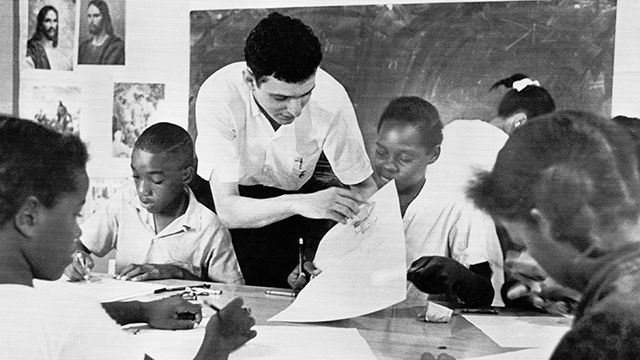This post first appeared at the Brennan Center for Justice blog.

A few weeks ago, to the low roar from a Brooklyn music venue, I got carded. It doesn’t happen often anymore. While the bowling pins fell and as the Williamsburg hipsters ordered their mojitos, I looked at the baby-faced bouncer looking at my ID. “Yeah. That’s right,” I said to him. “I was born the year the Civil Rights Act passed.”
He chortled and let me in. There was no way he thought I looked too young to drink. Still, I felt a frisson of victory. Me: dispensing small nuggets of civil rights history on my Brooklyn bar crawl. That’s how you do it these days, kids.
But if the summer of 1964 was Freedom Summer then what is the summer of 2014?
It might end up being remembered as Courtroom Summer — the summer of litigation as Department of Justice lawyers trudge from courthouse to courthouse trying to assert the last vestiges of power in the Voting Rights Act of 1965.
Following last year’s Supreme Court ruling disabling the Act’s key pre-clearance provisions — the requirement that jurisdictions with a history of vote suppression get approval for all voting procedure changes from the Department — the attorney general vowed to use remaining portions of the Act to protect voting rights.
From Corpus Christi to Winston-Salem, Columbus to Milwaukee, lawyers are double-checking their briefs and triple-checking their expert reports.
In Texas, the Department of Justice is set for trial in September challenging the state’s voter-ID laws, described by many as the most restrictive in the nation. In North Carolina, DOJ awaits a ruling on its request for a preliminary injunction barring implementation of that state’s extraordinary array of restrictive voting requirements — new ID rules, limited voting hours, scaled-back registration opportunities. Meanwhile, in Wisconsin, a federal judge struck down that state’s new voter-ID law. But now an appeal is in the offing, and DOJ intervened in the case. Finally, in Ohio, DOJ joined a suit seeking to overturn a state law limiting early voting.
It’s a relief to see so much effort spent fighting laws that were designed to give the finger to the legacy of Freedom Summer. But the suits are no substitute for a robust Voting Rights Act. As the Brennan Center’s Tomas Lopez recently reported: “Bad laws with lasting, harmful consequences now lack a review mechanism, the method of fighting these laws is now limited to costly and time-intensive litigation, and the public has lost the one centralized means to track the thousands of changes annually that affect Americans’ right to vote.”
Fifty years ago this summer, hundreds of young black and white students spread out through Mississippi on a mission to register black voters. They traveled south, fully aware that their colleagues, James Chaney, Andrew Goodman and Michael Schwerner, had disappeared. On Aug. 4, 1964, in the middle of Freedom Summer, the FBI found their bodies buried in an earthen dam on property owned by a Klansman.
Fear aside, what must it have been like to feel that the winds of justice were at your back? To know that both society and the law were turning, slowly but inevitably, toward expanding and protecting voting rights?
It doesn’t feel that way today. At the midpoint of Courtroom Summer, the winds blow against the lawyers fighting in Texas, Ohio, North Carolina and Wisconsin. Public opinion favors voting restrictions. State legislatures are relentless, passing laws making voting more cumbersome. Congressional efforts to overcome last year’s Supreme Court ruling are stalled.
Why was Freedom Summer so different than Courtroom Summer? A combination of factors made 1964 possible: the desperation of the situation, a young generation primed for activism, faith in government action and a cluster of towering leaders from Bayard Rustin, A. Philip Randolph and Martin Luther King Jr. to LBJ.
Not a one of these factors is present today. The civil rights situation is nowhere near as dire. Meanwhile, our government has never been more dysfunctional or disdained. No wonder young people were vastly more interested this year in a soccer tournament in Brazil than in the upcoming federal elections where control of the Senate is at stake.
The good news is that though the anti-voting rights coalition is uncomfortably successful, it’s unlikely that we will ever slip back to pre-Civil Rights Act conditions. But that’s not good enough. We’re at risk of a slow but steady wounding. We’re in danger because a 1-to-2-percent change in turnout by certain voter groups can swing elections even while the remaining voters smugly note that if you need an ID to rent a movie, why not to vote.
There are some signs of hope though. Evidence of a civil rights spring? A group of students are suing in North Carolina. In Florida last year, protesters at the state capitol ended a month-long sit in with a voter registration drive. We need more spring buds. Until then we’ll always have the courtroom. Plus the bouncers of Williamsburg.
The views expressed in this post are the author’s alone, and presented here to offer a variety of perspectives to our readers.


